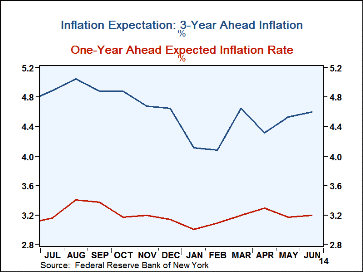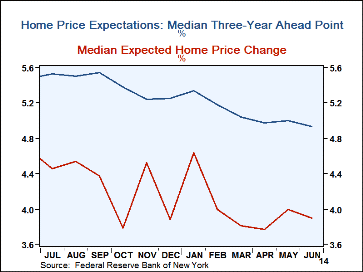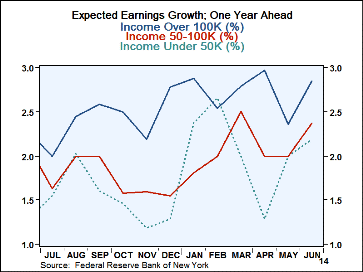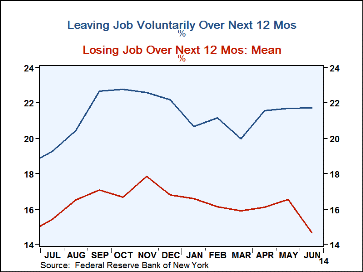 Global| Jul 14 2014
Global| Jul 14 2014N.Y. Fed: Consumer Expectations Vary Over The Last Year
by:Tom Moeller
|in:Economy in Brief
Summary
Households expectations regarding inflation have been fairly sanguine. The expected inflation rate of 3.2% during the next year was unchanged and near the midpoint of the varying changes during the last year. Inflation expectations [...]
Households expectations regarding inflation have been fairly sanguine. The expected inflation rate of 3.2% during the next year was unchanged and near the midpoint of the varying changes during the last year. Inflation expectations during the upcoming three years were constructive, for an inflation rate of 3.3% versus a 3.8% rate as recently as last August.
Home price expectations deteriorated. The latest figure of 3.9% home price inflation for the next year was down from 4.6% in January. It compared to a lessened median estimate of 4.9% for the next three years, down from 5.5% last summer. By region, expectations for home prices during the next year varied between 3.6% for the Northeast and 5.3% in the West.
The firmer labor market generated varying perceptions regarding income growth. The 2.5% expectation for earnings growth during the next year was a series' high and up from 1.8% in December. Expected household income growth of 2.6% also was improved versus 2.0% in December. Expectations varied greatly, however, by income bracket. High income earners expected to earn 3.0% or more during the next year, a percentage point greater than those earning less than $50,000.
Perceptions of employment conditions improved of late. A series low 14.7% thought they would lose their job during the next twelve months, down from last year's 17.9% high. Job churn was in evidence as a raised 21.7% thought they'd leave a job voluntarily during the next twelve months.
The new Federal Reserve Bank of New York Survey of Consumer Expectations is dedicated to household finance. The information collected in the survey on household income, spending, and access to credit provide a real-time picture of U.S. households' situation and perceptions. The Consumer Expectations data can be found in Haver's SURVEYS database.
| Survey of Consumer Expectations - Federal Reserve Bank of N.Y. (%) | Jun | May | Apr | Jun'13 |
|---|---|---|---|---|
| Median Expected Inflation Rate | ||||
| One Year Ahead | 3.2 | 3.2 | 3.3 | 3.1 |
| Three Years Ahead | 3.3 | 3.2 | 3.2 | 3.4 |
| Median Home Prices | ||||
| One Year Ahead | 3.9 | 4.0 | 3.8 | 4.7 |
| Three Years Ahead | 4.9 | 5.0 | 5.0 | 5.5 |
| Earnings Growth | ||||
| Overall | 2.5 | 2.0 | 2.0 | 2.0 |
| Education High School or Less | 2.5 | 1.6 | 1.3 | 1.5 |
| Education Some College | 2.0 | 2.0 | 2.0 | 1.7 |
| Education BA or Higher | 2.7 | 2.6 | 2.7 | 2.3 |
| Job Separation Expectations | ||||
| Probability of Losing a Job | 14.7 | 16.5 | 16.1 | 14.7 |
| Probability of Leaving a Job Voluntarily | 21.7 | 21.7 | 21.6 | 18.5 |
| Household Income Growth | ||||
| One Year Ahead: Total | 2.6 | 2.3 | 2.6 | 2.3 |
| Under 50K | 2.0 | 1.9 | 2.2 | 2.1 |
| 50-100K | 2.9 | 2.8 | 2.6 | 2.8 |
| Over 100K | `3.3 | 2.9 | 3.4 | 3.5 |
Tom Moeller
AuthorMore in Author Profile »Prior to joining Haver Analytics in 2000, Mr. Moeller worked as the Economist at Chancellor Capital Management from 1985 to 1999. There, he developed comprehensive economic forecasts and interpreted economic data for equity and fixed income portfolio managers. Also at Chancellor, Mr. Moeller worked as an equity analyst and was responsible for researching and rating companies in the economically sensitive automobile and housing industries for investment in Chancellor’s equity portfolio. Prior to joining Chancellor, Mr. Moeller was an Economist at Citibank from 1979 to 1984. He also analyzed pricing behavior in the metals industry for the Council on Wage and Price Stability in Washington, D.C. In 1999, Mr. Moeller received the award for most accurate forecast from the Forecasters' Club of New York. From 1990 to 1992 he was President of the New York Association for Business Economists. Mr. Moeller earned an M.B.A. in Finance from Fordham University, where he graduated in 1987. He holds a Bachelor of Arts in Economics from George Washington University.
More Economy in Brief
 Global| Feb 05 2026
Global| Feb 05 2026Charts of the Week: Balanced Policy, Resilient Data and AI Narratives
by:Andrew Cates










